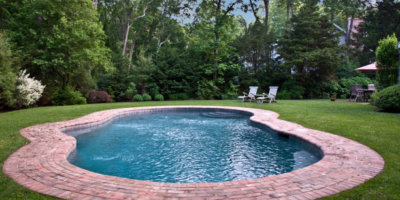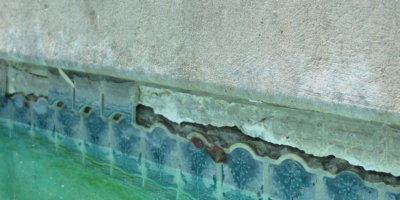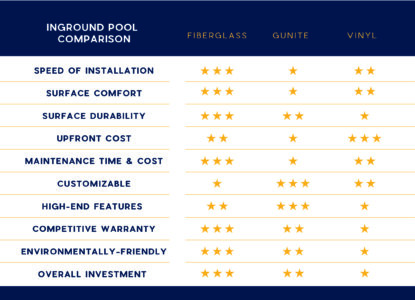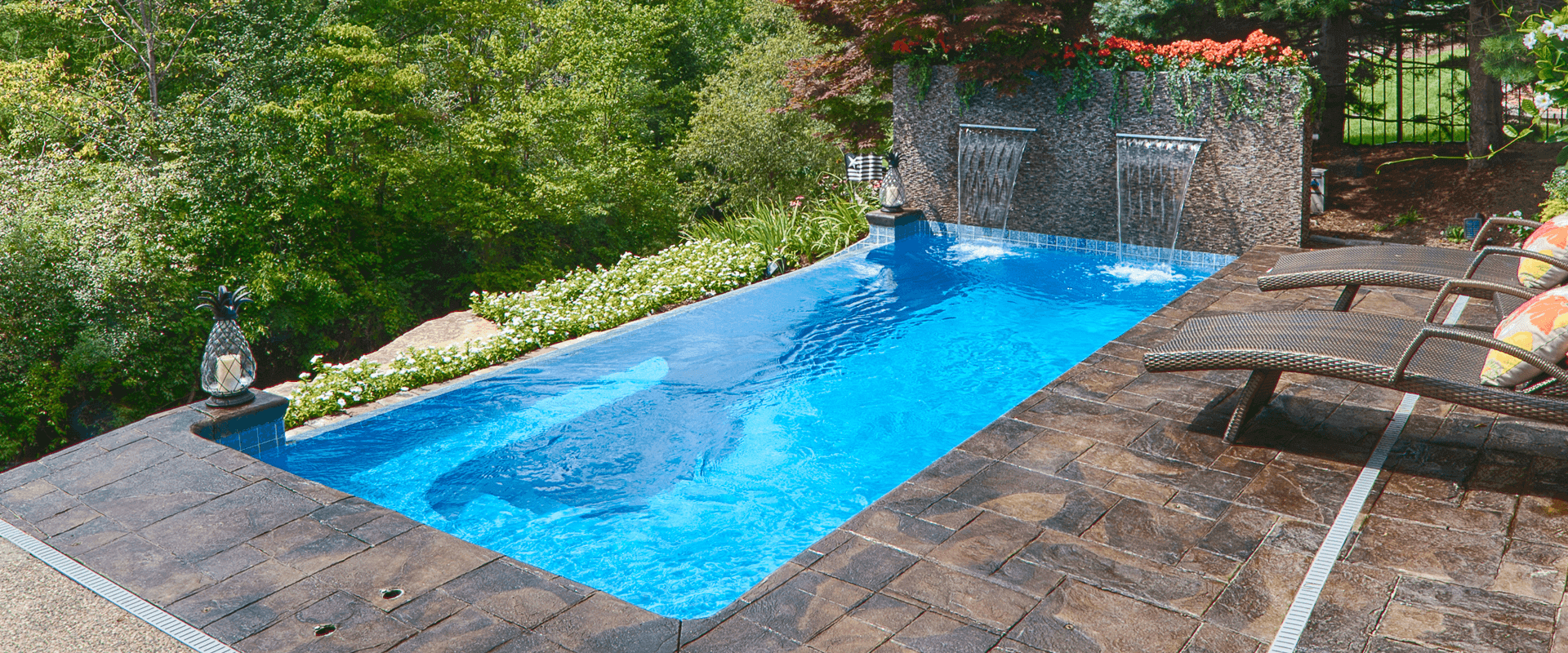877-929-7665
What is the Average Life of a Gunite Pool?

What is the average life of a gunite pool? A quick search on Google will confirm that the general consensus among professional pool builders is, on average, about 30 to 50 years. Your quick reply or thought might be, “okay, that’s a wide range; just how long do they last?” You’re right. It is a fairly wide range, and that’s due to another question you will want to ask yourself. What type of life do you intend to give your gunite (or fiberglass or vinyl) pool? A gunite pool, like other inground pool types, can be durable and long-lasting but will require a lot of love and care to remain in ideal condition.
Most homeowners shopping for pools tend to compare fiberglass, vinyl, and gunite. Head down that path, and you’ll learn some fundamental differences and find that gunite and fiberglass are known for similarly long life spans. When properly maintained, both can last a long time. What you may not know are some details that figure into the lifespan of a gunite pool. The key to a long pool life is what happens long after installation. This article will help you understand more about the average life of a gunite pool, what gunite is, and the pros and cons of owning a gunite pool.
Gunite-at-a-glance
What is gunite? It’s easy to adopt construction shorthand and use ‘gunite’ and ‘concrete’ interchangeably, but if you’re a professional pool installer, you may choose to define it a little more tightly. Gunite is a pneumatically-sprayed-on mix of cement, water, and sand. Its properties make it superior to what you might think of as straight-up concrete. Namely, the particles are smaller, and the mix occurs at the point of delivery. With concrete, the blend includes larger aggregates and is pre-mixed. It’s completely understandable if you want to use them interchangeably, though! To the average pool buyer, gunite is concrete, and concrete is gunite.
A gunite pool is typically constructed in layers. Once a hole has been excavated, the steel grid and plumbing make up the first layer. Then the gunite mixture consisting of cement, water, and sand is sprayed on, followed by the third layer consisting of tile and coping. Finally, the last layer includes your electrical and plaster. The entire process usually takes several months.
Let’s deconstruct what makes up the life of a gunite pool.
There are two ways to look at answering the question. “What makes up the lifespan of a gunite pool?” One, annual maintenance requirements and costs, and two, the “non-annual” periodic events that will be required. From a maintenance perspective, gunite surfaces are more porous, so algae can become a problem if you do not stay on top of it. You will need to chemically treat the pool as long as it holds water and acid wash its surface, on average, about once every four years. Your periodic event to consider to improve the longevity of your gunite pool is that you may need to replaster. How often should a gunite pool be resurfaced? You find it ranges from every 10 to 15 years on average. Wondering how much does it cost to resurface a gunite pool? According to homeguide.com at least $6,000 – $15,000. And finally, how do you know when your pool needs to be resurfaced? You’ll likely see signs of the plaster peeling or flaking, stains in the pool, and structural damage starting to form. Now that we’ve explored the elements that make up the life of a gunite pool, let’s look at the pros and cons of owning a gunite pool.
Gunite Pools Pros
- Highly customizable. Builders create gunite pools in various sizes, shapes, and depths. Gunite is for you if you’ve got an unusual backyard footprint or are looking for a highly designed pool, say a lagoon with waterfalls and rock features. Fiberglass pool designs have become more diverse, but the shells still come from a large, pre-designed, reusable mold to generate cost-efficiencies.
- Durable. Gunite pools are rock-solid hard because they are typically constructed in layers. Once a hole has been excavated, the steel grid and plumbing make up the first layer. Then the gunite mixture consisting of cement, water, and sand is sprayed on, followed by the third layer consisting of tile and coping.
Gunite Pool Con
- Initial cost. Gunite pools tend to cost a little more upfront. Depending on the size, depth, other features, and market conditions, the price has recently started at about $100,000, according to Angi.com. It can vary by geography, demand, and other factors.
- Annual maintenance — an answer to are gunite pools hard to maintain? The porosity of gunite makes it more sensitive to the elements and nuisances such as algae growth. If you own a gunite pool, you can expect to spend on average around four to five hours a week on regular maintenance. According to Forbes.com, depending on size, your annual gunite pool maintenance costs could amount to $3350 on average. This cost compares to about $900 on average for fiberglass pool maintenance.
- Lifetime costs. Outside of regular maintenance and opening/closing, you’ll need to make periodic investments that you’ll want to budget for with a gunite pool. First, you’ll need to acid wash the surface about every four years. Second, expect to replaster after about ten to fifteen years. Replastering a gunite pool costs roughly $5500 per 1000 square feet unless you choose a longer-lasting ‘pebble’ option which could be more than double that, according to Angi.com.
- Potential problems with plaster. Over time, the gunite pool’s plaster surface can deteriorate. Issues you may see include flaking, peeling, stains, roughness, discoloration, cracks, rust spots, and dislodged pebbles or aggregate.
- Installation time. You could miss the next swim season depending on when your pool project starts. A gunite installation can take two to three months, depending on the weather.
Other potential downsides to gunite pools include relative incompatibility with salt systems, and the feeling of gunite’s rough surface which may not be preferred for some swimmers.
Quick Comparison: Pros and Cons of Gunite and Fiberglass Pools

Gunite Pools Average Life Bottom Line
There might not be a true average life of a gunite pool due to their design variability and how well they are maintained. But, if you need a custom design due to an unusual backyard or unique design needs, gunite is an excellent way to go. Of course, you’ll pay a little more upfront and in annual maintenance and wash/resurfacing costs, but you’ll get a durable, long-lasting pool provided that you are diligent in maintaining the pool. So, is a gunite pool worth it? That one is for you to decide based on how much your time is worth, the length of time you’ll be in your home, and other factors.
